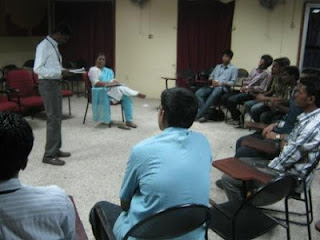Dhiyanesh Ravichandran.
 A mob of over 20 men dragged a 16-year old girl by her hair into one of the busy city roads of Guwahati, tried to rip off her clothes, yanked up her vests and tugged at her bra, groped her breasts as she begged for help from passing cars. They who sexually abused and mugged her publicly, smiled at the cameras which filmed the whole episode and the cameras panned up and down her body focusing on her breasts and thighs as if they were intentional (maybe!!) and hit the TV sets after few hours with no qualms of media ethics. And the CM's office and the National Commission for Women (NCW) panel went further in abusing by revealing the victim's identity and then apologising for their mistakes latter. The NCW chairperson latter commented in a statement that women should be “careful about the way they dress because such incidents are a result of blindly imitating the West” and the Chief Minister of Madhya Pradesh saying that the women should follow Indian culture in their dressing and behaviour, all humiliating and degrading our womenfolks. The distressing incident and the controversies that followed up, all hint one thing in common. It's nothing but the insensitivity that we, the people and our system shows on the status of our women and while dealing with the crime against them. India is one of the worst places in the world for the women to live I presume regretfully.
A mob of over 20 men dragged a 16-year old girl by her hair into one of the busy city roads of Guwahati, tried to rip off her clothes, yanked up her vests and tugged at her bra, groped her breasts as she begged for help from passing cars. They who sexually abused and mugged her publicly, smiled at the cameras which filmed the whole episode and the cameras panned up and down her body focusing on her breasts and thighs as if they were intentional (maybe!!) and hit the TV sets after few hours with no qualms of media ethics. And the CM's office and the National Commission for Women (NCW) panel went further in abusing by revealing the victim's identity and then apologising for their mistakes latter. The NCW chairperson latter commented in a statement that women should be “careful about the way they dress because such incidents are a result of blindly imitating the West” and the Chief Minister of Madhya Pradesh saying that the women should follow Indian culture in their dressing and behaviour, all humiliating and degrading our womenfolks. The distressing incident and the controversies that followed up, all hint one thing in common. It's nothing but the insensitivity that we, the people and our system shows on the status of our women and while dealing with the crime against them. India is one of the worst places in the world for the women to live I presume regretfully.
The Guwahati girl molestation case is quite shocking, but it happens everywhere all over the country and there is nothing novel about it. Infact, this case has proved that the north-eastern states are no exception to such crimes against women. But cunningly, people in power, fundamentalists, and others who couldn't assimilate the sorry state of affairs blame the victims themselves, by pointing out women's dressing which provocates men to commit such crimes. By 'provocative dressing' they grossly mean all the dresses which are not in consonance with our traditions and culture, or to be much more exact, all the dresses from the western world. First of all, it is highly subjective to define socially acceptable dressing, since India is a dynamic multi-cultural or heterogenous society. We have nothing like a 'static' culture or tradition - cultures differ from place to place, traditions of Tamil nadu greatly vary from that of Assamese. A typical Tamil woman's attire may not get the consent of a marathi tribe, and we all know that the dressing of North-east people especially women are totally different to the rest, which would be unacceptable in the so called Indian 'mainland'. Social Anthropologists can say that the present-day saree and a salwar kameez is a derivative of several cultures and practices through ages, as a result of cultural interactions. And also, there is nothing concrete called a 'Western culture' and the influence of other cultures on our behaviour is not new to the present world and is a universal phenomenon.
 |
| There is nothing called a 'static culture'. |
Does a girl's dressing really provocates or sexually allures men? Maybe. But is it a valid cause to such extent that men couldn't control lust and commits heinous crimes like what our country has reported all these days? I certainly have reservations to that. Such people say that a 'provocative dresss' is anything which shows a great deal of a women's body and structure. The degree of the so-called 'provocativeness' is also contexual to one's own culture. A jeans with a full-hand kurti covers almost all the parts of a girl's body from wrist to ankles, but may not get a cultural sanction like a traditional saree, which is more liberal comparingly. A women in bikini in the beaches of Goa may not be sexually stimulative for the beach hawkers, but a women in burqa, face veiled and hands gloved with only visible eyes, can be seductive and become prey to men. There have be instances where a 70 or 80 year-old women in burqa were raped and molested in India, it would be ridiculous to say that one's attire is the major or only reason for all such crimes. Even the NCW's statistics disprove the myth. Can anyone claim that all the women who are 'careful' about the way they dress are safe at our streets?
 |
| SAREE: Really a modest way of dressing? |
Let us consider that a woman's attire is extremely provocative, culturally unacceptable and creates a 'cultural shock'. But do men have the right to touch that woman, pointing out her dressing? What empowers them to rape, molest and harass a women on the name of her dressing? Is it morally, ethically and culturally justifiable? Does such acts have any social or cultural sanctions or an element of our traditional practices? Can women rape or mug a rural man who is usually half-naked? People who point out women's dressing for all the crimes against women are directly or indirectly justifying those wicked conduct. Why no one is ready to question men's attitude towards women, who is always considered as a source of sexual pleasure? The ugly answer is more social, such a mentality is a direct mark of patriarchy and violence against women is an absolute feature of the patriarchal society.
Every human beings have their own liberty to dress the way they wish and no one can take away their wishful right. No one has the right to strip a woman, rape her, molest her and do anything that ravage her dignity pointing out her attire. That is no way justifiable from any perspective. Even if she's naked or a sex worker. Not even her husband can do that. And justifying such crimes is even more sinful than the very act itself. But society always has some diktats or the other on all our dressings, which is inevitable and has certain latent functions too. But one need to understand the social injustice behind those norms and sanctions, and pathos tagged to it. Such wide prevalence of atrocities against women proves that our society is just camouflaged with the modern ideals and has not progressed in true sense.
I do not completely rule out the fact that a woman's dressing provocates men. Nor I'll advise my sister to be more liberal to an extent in her dressing. Women's attire is not that valid and the only cause for all the crimes against them by men. By acknowledging such blames by few people who may have some hidden agendas, say for political mileage or self-defense, we miss out the real causes and factors underlying to it. Every social problems will have multiple root-causes and contributing factors, which needs to be addressed so as to improve the condition. Corporates do have a hand in setting trends on modern-day dressing, which is purely commercial and is a technique to increase their profits. Most of our women fall prey to that in the name of empowerment and excercising their liberty, which must be debunked. Unwanted cultural shocks can be avoided. It is nonsensical to say that women's safety lies in their own hands. As a community, we have to evaluate ourself on these issues and address the real concerns. Let us not forget that our patriarchal mindset towards our women and commodification of women as a source of sexual pleasure and insensitivity towards the unjust against them could say lot more about such issues. Gandhiji once said,
"Of all the evils for which man has made himself responsible, none is so
degrading, so shocking or so brutal as his abuse of the better half of
humanity; the female sex (not the weaker sex)."
Let our women live with dignity.



